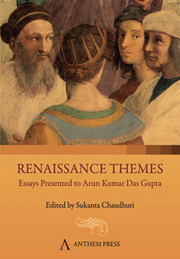Book contents
- Frontmatter
- Contents
- Preface
- List of Contributors
- Arun Kumar Das Gupta
- The Renaissance God as Man of Letters
- Ramist and Senecan Elements in Joseph Hall's The Art of Divine Meditation
- Hypocrite Lecteur: Reading on the Early Modern Stage
- Vertigo
- Folly and Androgyny: Shakespeare's King Lear
- ‘Fatal Visions’ in Macbeth
- The Miltonic Dissimile: Language and Style in Paradise Lost, Book 4
- ‘A Moving Grave’: Positioning Samson Agonistes
- Plate section
The Renaissance God as Man of Letters
Published online by Cambridge University Press: 05 March 2012
- Frontmatter
- Contents
- Preface
- List of Contributors
- Arun Kumar Das Gupta
- The Renaissance God as Man of Letters
- Ramist and Senecan Elements in Joseph Hall's The Art of Divine Meditation
- Hypocrite Lecteur: Reading on the Early Modern Stage
- Vertigo
- Folly and Androgyny: Shakespeare's King Lear
- ‘Fatal Visions’ in Macbeth
- The Miltonic Dissimile: Language and Style in Paradise Lost, Book 4
- ‘A Moving Grave’: Positioning Samson Agonistes
- Plate section
Summary
In the satirical Letters of Obscure Men circulated by Crotus Rubeanus, Ulrich von Hutten and others shortly before the Lutheran Reformation, one of the lampooned old-style clerics pours scorn on Erasmus' new learning:
In the way of Poetry I admit that he can speak fair Latin. But what of that? We can learn many such things as that in a year. But in respect of the philosophic sciences, such as Theology and Medicine, much more hath to be done if one would fain learn them. And yet would he be held a Theologian. But, my good Master, what kind of Theologian? A novice, forsooth, who dealeth with words alone, and tasteth not the inner meanings of things;[…]
In fact, all through the Letters, special scorn is poured on ‘poets’, i.e. those who have imbibed the new literary and philological tenets of the Revival of Learning. In another letter, Erasmus is coupled with the clerics' special target, the Hebraist Johann Reuchlin:
And it is no great matter to us what those innovators in Latin do, such as Erasmus of Rotterdam and Johann Reuchlin, neither heed I them. It concerneth not the essence of Holy Scripture – even if they and the rest are ever ready to attack the old Theologians with that Literature of theirs. I know not how they presume to ever be mingling that heretical literature of theirs with the New Testament and the works of St. Jerome; notwithstanding that Paul saith that the Greeks are always liars, and hence it seems to me – saving our exalted Magisternosters' presence – that their literature is nothing else than a lie.
- Type
- Chapter
- Information
- Renaissance ThemesEssays Presented to Arun Kumar Das Gupta, pp. 1 - 16Publisher: Anthem PressPrint publication year: 2009



